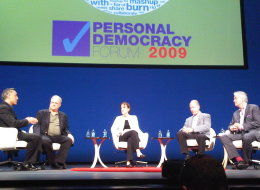Yesterday, the dialogue at the Personal Democracy Forum conference at Lincoln Center in New York ranged from focused conversations on the MySpace/Facebook divide to enterprising talks on collaborative health care. Today, the lineup is sure to bring a similar diversity, including some candid panels with technology and development officials from the Obama administration like Beth Noveck, author of Wiki Government and Vivek Kundra, White House CIO.
Throughout the day, we'll be posting highlights and tweeting real time thoughts on the conference. For those in the neighborhood or at the conference, tweet @ctznjournalism to interact or meetup with Huffington Post reporters between sessions. The liveblog from Monday is still up in case you need to catch up on the events of day one at the conference.
9:36AM ET: The morning started with an all-star lineup of various members of the Obama administration tasked with improving transparency in the government through technology. Taking Vivek Kundra's lead, the government is setting up a number of bringing the nation's capital into the 21st century as the Chief Technology Officer of Washington DC, Kundra became the nation's Chief Information Officer in March of this year. The projects he has helped launch include a website called IT Dashboard that allows citizens to track and respond to governmental investments as well as Data.gov which serves as a collaborative environment to study governmental data.
In the following session, the White House Open Government Initiative's Deputy Chief Technology Officer Beth Noveck walked the conference attendees through the three phases of the Open Government Directive. This process address directly President Obama's commitment to improving transparency and participation in the operations of the government as outlined in his recent memo. Citizens can visit the Directive's drafting of the final report at the collaborative writing site Mixed Ink. The report--and your voice--will go straight to the president.
10:45AM ET: Todd Herman, the Director of New Media at the RNC, was given a charge by Chairman Steele: "Take the lid off."
Democrats, especially during the Obama campaign, have dominated the Internet battle with better online organizing tools and more affective Web-driven fundraising (see Act Blue).
Speaking to an eighty-percent Democratic audience (according to the conference organizer), Herman began by showing a screenshot of change.gov and lauding the success and ingenuity of the Democrat's online capabilities. He was playing to the pride of a room filled predominately with progressive computer geeks, where an air of inevitable Internet dominance pervades (Silicon Valley is overwhelmingly progressive after all).
But then Herman issued a warning: "There is nothing genetically stopping us [Republicans] from being good at this... John McCain had the buttons, we just didn't use them."
In essence, John McCain's problem, according to Herman, was that he didn't have the foresight to emphasize the Internet -- not that the Republican machine didn't have the ability to produce effective online organizing tools.
As Personal Democracy Forum MC Andrew Rasiej pointed out, Herman might have missed the point since the interface through which a campaign interacts with its supporters is only a part of the equation, you also need committed supporters who want to engage with the campaign online. The significantly younger demographic of the Democratic Party favors progressives, which constitutes a difficult hurdle to overcome for GOP candidates.
With Herman releasing a new RNC website in about a month and a half, the proof will be in the html.
2:56PM ET Frank Rich, Karen Tumulty, Dan Gillmor, Scott Simon, and Andrew Rasiej on stage at the personal Democracy Forum talking about how new media is changing the way we produce news.

3:56PM ET As the above panel played out, the conversation quickly became a meta discussion on how the media is changing and what media professionals have to be excited about (or fear). Dan Gillmor, author of We the Media: Grassroots Journalism By the People, For the People sounded optimistic as ever about citizens as journalists and journalism as a collaborative process rather than a static one.
The use of Twitter in Iran is one example of Gillmor's organic media process. On the other hand, Frank Rich took a more traditional route, saying at one point that the use of Twitter as a type of media outlet is "just more complicated than that." Karen Tumulty of TIME magazine actually said point blank, "This is a terrifying time to be a journalist."
In the decades old words of Marshall McLuhan, "The medium is the message." Out of the backing and forthing a clear iteration of the idea that thousands of channels and new modes of communication will change the way that people read, understand, and interact with the news. Scott Simon of NPR explained that if an interview ever slows down or needs to take a new direction, they open the questions to their Twitter community.
It makes sense that this kind of off-the-cuff grassroots journalism might continue evolving. As in Iran, people will speak when they want to be heard. What's exciting is that we're finally within earshot (or Tweetshot) of those voices.